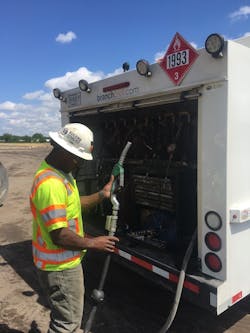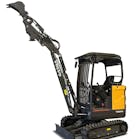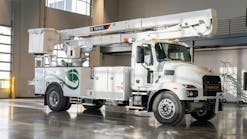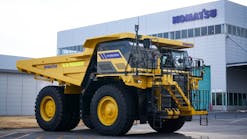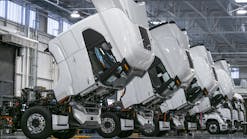Tier 4-F engines are more sensitive than ever; this is particularly true for their high-pressure common rail fuel systems.
“The most common culprit when it comes to damage is water in the fuel, which often comes from unmaintained transfer tanks,” says Keith Kramlich, national service and warranty manager at Takeuchi.
Kramlich says the tanks can have a number of issues.
“In some cases, they rarely get drained, and water accumulates in the tank from condensation,” he says. “Due to the location of these tanks and the environment the service trucks are in, they can collect heavy debris. So it’s important to clean the fuel cap and surrounding area before filling the transfer tank.
“If the tank isn’t maintained, the water content will continue to increase and could lead to rust inside the tank and lines,” Kramlich says.
To help with this issue, Takeuchi machines, and those from a number of other OEMs, come equipped with a fuel and water separator—but it’s not a complete solution on its own.
“It needs to be checked and drained daily,” Kramlich says. “If it isn’t and the water level reaches the top of the separator, water will be forced through the separator and back into the fuel system, reaching vital components.”
Water in the fuel can impact several different aspects of the machine, according to Kramlich:
- Most often, it will decrease the lubricity of the fuel. This causes damage to the needle valve inside the injector, which will become sticky and result in high return flow or high fuel delivery.
- The needle valve can also be damaged to the point it no longer seals properly, allowing the injector tip to leak.
- Metal from the needle valve damage, or from other component damage, can clog the nozzles, resulting in a distorted spray pattern. This will result in fuel being sprayed directly onto the piston surface or the cylinder wall.
- Fuel directly injected into the cylinder wall will cause cylinder wash, which is when the fuel washes the lubricant oil away. The result is poor lubrication between the piston and cylinder wall, causing wear. This inevitably leads to low compression, oil dilution, and engine failure.
- In some cases, free water can be pushed into the injector. Excessive heat in the injector will cause this water to turn into steam and expand, triggering a failure in the injector tip.
- Excessive heat in the injector will cause the water to turn into steam and expand, triggering a failure in the injector tip.
- Damage to the needle valve can prevent it from sealing properly when shut. This allows non-atomized fuel to leak onto the piston surface, resulting in a melted piston.
- Other contaminates, such as dust particles and low-quality diesel fuel with low lubricity properties, will damage the fuel system as well.
“For all these reasons, it’s critical to maintain a clean fuel system and frequently change fuel filters,” Kramlich says. “Every Takeuchi machine has one to two fuel filters and a water separator. The fuel system on our machines is very effective at removing harmful contaminants and water from the fuel system; however, fuel filters can’t filter fuel contaminants if the filters are not serviced regularly.”
Kramlich says ensuring that clean fuel is being used is the simplest and most important thing to do. “This includes using a trusted source that has clean and filtered fuel. When filling, it’s also necessary to have the fill neck screen in place to prevent large debris from entering the tank. Large debris can restrict the fuel flow from the tank or, depending on the material, it can break down and become small enough to cause fuel system issues.”
Usually, the first sign of engine failure from fuel contamination is multiple failed injectors.
“Though these are the same components, they operate separately and only have one thing in common—the fuel source,” Kramlich says. “If an operator starts to notice poor engine performance, excessive smoke, unnecessary regeneration requests, or anything else abnormal, it’s best to stop the engine before catastrophic damage occurs.
“Some things are easily fixed, but an engine is not,” Kramlich says. “A failed engine will cost a lot more than just a minor work interruption. Using clean and filtered fuel of the best quality is paramount and will save the owner thousands in repair costs along the way.”
